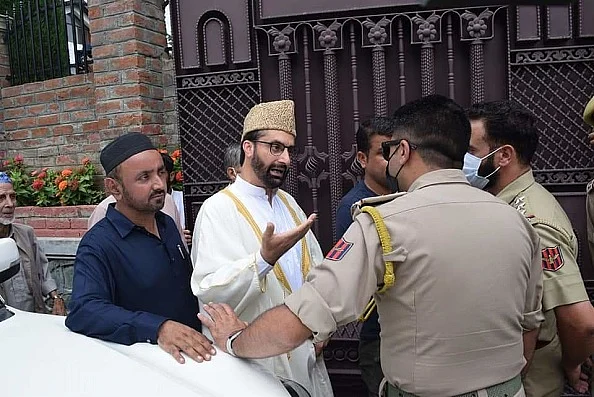Hurriyat Conference chairman Mirwaiz Umar Farooq on Friday shared visuals of being held under a house arrest and not allowed to offer the congregational prayers at the Jamia Masjid in Srinagar.
The Hurriyat chief was scheduled to visit the Jamia Masjid in the Nowhatta locality of the city to offer the congregational Friday prayers. But, he claimed, he was not allowed to come out of his residence in the Nigeen area of the city.
Mirwaiz, who is Kashmir's chief cleric, delivers a sermon at the historic mosque on Fridays.
Farooq spoke to 바카라 India on the matter and confirmed that prayers were yet again not allowed in Jama Masjid today. He stated, "Its outrageous that authorities continue to trample on our religious rights. Again this year people were barred from offering prayers at Jama Masjid or even Eid Garh."
Further adding, "While I was not allowed outside the house and the meeting of the Mutahida Majlis-e-Ulama was also not allowed. The MMU has passed a resolution which was to be read in mosques, shrines and imambaras across J&K. But clerics were not allowed to even read the resolution."
The Mutahida Majlis Ulema (MMU) is an amalgam of several religious bodies who have passed a resolution against the Waqf Amendment Act.
Mirwaiz Umar Farooq Shares Visuals, Resolution By MMU On X
Mirwaiz took to X to show that the authorities have 'trampled' his basic religious rights, he said, "Yet again, this Friday put under house arrest and barred from offering prayers at Jama Masjid. It's is both heartbreaking and outrageous that authorities continue to trample on my basic religious rights at their will."
He also posted a copy of the resolution formulated by the Mutahida Majlis Ulema (MMU) against the Waqf Amendment Act.
"Mutahida Majlis-e-Ulama Jammu & Kashmir, expresses its concern regarding several provisions of the new law, which are being widely viewed by the Muslim community as affecting the established and religious character of the Waqf institution in India," the resolution read.
The resolution said the new legislation introduces significant changes in the management and supervision of Waqf properties, and many feel that it may diminish the role and authority of the Muslim community in overseeing its religious endowments, which have traditionally been managed in accordance with Islamic principles.
The resolution was formulated by the MMU after its meeting on the issue was not allowed on Wednesday.
According to PTI, the MMU said the "reduction in the powers" of Muslim-led Waqf Boards, and the greater role now assigned to government authorities and non-Muslim officials, has led to apprehensions that the core religious and charitable purpose of Waqf may not be fully understood or upheld.
"The provision allowing non-Muslims to be appointed to the Central and State Waqf Boards, and the removal of the earlier condition that the CEO of a Waqf Board must be a Muslim, has been viewed by the community as a deviation from the spiritual and religious ethos of Waqf management," it said.
The religious amalgam said the transfer of key decision-making powers to district collectors, including the authority to determine whether a property is Waqf or not, may lead to unilateral decisions and a weakening of the role of Waqf Boards.
"This is of particular concern in the context of ongoing disputes involving Waqf properties in various regions," it added.
The MMU said the removal of the concept of 'Waqf by long-standing use', which protected mosques, graveyards, and other Islamic sites used for generations without formal documentation, may result in the loss of such properties simply due to a lack of official records, reported PTI.
"Changes in the functioning of Waqf Tribunals, allowing for appeals in High Courts, may lead to prolonged legal proceedings and delays in the resolution of matters affecting religious endowments," it said.
The MMU said it reaffirms its full support to the All India Muslim Personal Law Board (AIMPLB) and will stand by the Board in whatever course of action it deems appropriate to address the issues arising from the new law.
It also called upon the Muslim community to remain united, aware, and engaged, and to support all peaceful and lawful efforts for the protection and proper functioning of the religious institutions and endowments.
Earlier, the authorities in Kashmir did not allow the Mutahida Majlis-e-Ulema (MMU) to hold a meeting over the issue of Waqf Act.
The MMU was scheduled to meet at the mirwaiz's residence in the Nigeen locality of the city here. The mirwaiz is the Hurriyat Conference chairman and the chief priest of Jammu and Kashmir.
"Office of @MirwaizKashmir has been informed by the authorities that the important meeting of Mutahida Majlis-e-Ulema (MMU) at his residence, regarding the Waqf Bill will not be allowed," the office of the Mirwaiz said on X.
It claimed that all lanes and bylanes leading to the residence of the mirwaiz have been "sealed".
"Religious representatives from all districts of J&K, including Ladakh, Kargil and Jammu belt had reached the valley to attend this important meet, aimed at discussing the serious concerns of the Muslim community regarding the recently passed Waqf Bill," it added.
Meanwhile, the mirwaiz said it was "strange" that even a discussion on the serious issue was "barred".
Farooq said every political party could freely express its views on the issue in Parliament and this right should also be extended to the Muslim political and religious representatives of Jammu and Kashmir.














